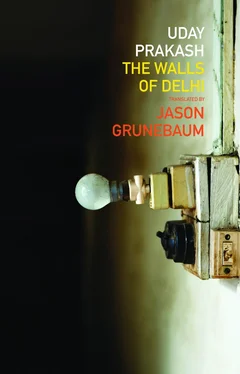Mohandas hadn’t come home the night Kasturi gave birth to Devdas. He’d been lying on the wide sandy bank of the Kathina, keeping an eye on the quiet sky above. It happened to be a new moon the night Devdas was born. Kasturi almost didn’t live through the delivery; the umbilical cord got twisted around the infant’s neck, with little Devdas stuck halfway out. Bilspurhin, who’d come to help with the delivery, announced that Kasturi, who’d passed out from fear, was in mortal danger.
Mohandas’s blind mother and coughing father looked everywhere to find their son, but he was nowhere to be found. He was lying on the sandy bank of the Kathina, staring up at the moonless sky like a corpse, searching for some sign of life inside him. The dark black of the new moon night, not blood, flowed through his veins. His gloomy mind couldn’t find sleep, it swarmed with visions of terror that had incubated in the womb of a system thoroughly rotten and corrupt.
Mohandas had probably passed out on the banks of the river that night — otherwise, he would have heard his mother and father calling him, or his wife shrieking, or his newborn son Devdas crying when he was born at four in the morning.
The sun had already risen well into the sky by the time its rays awakened Mohandas, who was lying on the banks of the Kathina one kilometre outside the village, out of his sleep, or swoon.
Mohandas lay still in the sand for a long time as he warmed up. His body was spent, his thoughts scattered. It began to dawn on him that he wasn’t on his balcony or in his courtyard; he was sprawled on the sandy riverbank, where he’d planted cucumbers and melons and loki and tomatoes just a few days ago. But the rains had come too soon, and the river had first swelled, then overflowed, until its ravenous crest had swallowed everything whole.
Mohandas returned home to find quite a crowd from the village assembled; women, too. It seemed they were all talking about him, and the crowd hushed and people scattered as soon as he arrived.
‘It was by the grace of god she pulled through, son. The villagers had already come with the tulsi leaf and said she was nearly dead,’ his mother said, wiping the tears away with a corner of her sari. ‘I swear that baby’s some kind of angel.’
He went into his wife’s little chamber. Kasturi was lying on the cot, sleeping with her baby; moments earlier, she’d been on the brink of death. Smoke from the cow dung cake burning in the borsi pot filled the room, along with the smell of the neem water and musty ajwain. Her eyes barely registered Mohandas’s presence; his heart sank when he saw how exhausted she was, how vulnerable. One more stomach had delivered itself to the house that morning. Arrangements for half a litre of cow’s milk would have to be made daily for nine months. Kasturi would need a diet of turmeric rice, ginger, ghee, and sweet gur for a month. And then he’d have to spend all kinds of money feeding relatives for the birth ceremony, the naming ceremony, the annaprashan milk-and-rice newborn feeding ceremony. And then… his gaze fell on the newborn sleeping against his mother’s side, a hale and hearty, pudgy little fellow, beautiful and innocent, snuggled against her, looking like the offspring of some divine being. Mohandas felt fatherly feelings well up inside for the first time, and he simply couldn’t take his eyes off of the boy.
‘The postman Sitaram’s here and he’s got something for you,’ Kaba called from the balcony.
Mohandas read the letter, from the biggest coal mine in the district, inviting Mohandas for an interview. It’d been more than a few months since he’d received this kind of invitation. Was it possible that while he lay in the sand on the banks of the Kathina his thoughts had produced some kind of sound that reached high up in the sky, finally reaching a celestial body? That a heavenly being perceived his sorrow, his calamitous state? Was the baby Kasturi gave birth to in the wee hours of the morning an angel who would unlock the door to a whole new life for his entire family?
The interview letter sent to by Oriental Coal Mines via the employment agency glowed with the promise of a new beginning. After a long drought, a tender sprout of hope grew once again in Mohandas’s heart. He couldn’t sleep the next night; though he had accepted the fact that his tree of life had been reduced to a dead stump, now it exploded with new shoots.
On the day of his interview, Mohandas arrived one hour early. Invoking the names of his family goddess, Malihamai, and his spiritual guru, Kabirdas, he experienced an unprecedented feeling of self-confidence, hungry for the job no matter what. A one hour written exam would be followed by an hour’s break, followed by the physical test. He dived into the tasks with all his mind and soul. He finished the hour-long exam in less than thirty minutes. The questions were easy, and multiple-choice; he had only to write a check mark next to the correct answer. For the two-hour physical exam they made him run a 1500metre dash, then a sprint, then lift some weights, then crawl on all fours over rough terrain, and finally run five laps around the field. He took an eye exam; they had him identify various colours. He didn’t come in second in any of these performances.
At four in the afternoon, the door opened to the office where the hundred and fifty other job applicants were sitting. The names of the five candidates that had been selected were called out, and Mohandas’s was number one.
His heart beat wildly — the impossible was happening. A quick end to all his life’s uncertainties. Every month, a pay cheque. Every day, a fire in the stove at home, and a hot, steaming curry. Medical treatment for his mother and father. No more need for Kasturi to work like a dog in the homes of others.
The clerk had assembled all of Mohandas’s diplomas and transcripts. Looking over his BA transcript he said, ‘Huh? You haven’t found a job yet? With just a little shoulder to the grindstone and you should’ve been able to find something decent.’
‘How soon can I start?’ Mohandas asked.
‘Consider yourself started. We’ll have all your papers processed by the end of the week at the latest, and then the contract will be sent to your house. At most the whole process will take two weeks.’
It was the dawn of a new era at the home of Mohandas. He had two thousand rupees sitting at the post office, and with it he bought a new mosquito net, a kilo of ghee, sweet gur, dried ginger, a few good pots and pans, new clothes for Kasturi and Devdas. For himself he bought a pair of jeans, a poly blend shirt with a checked pattern, a thirty-rupee wallet, a couple of five-rupee handkerchiefs. He made arrangements with Parasu for a half litre of milk to be delivered each morning. Word spread in the village that, at long last, Mohandas had found an honest-to-goodness job. Villagers who had utterly shunned Mohandas began to be civil, even solicitous. People who’d made fun of his degree and hard work began to sing a different tune.
‘It was just a matter of time. Mohandas couldn’t have sat around empty-handed for very long with his kind of degree.’
And then there were others who made comments like this: ‘You know that bamboo-weaver-whatever caste Mohandas belongs to? They’ve got job quotas for them now too. And he’s the one who got the quota job for his caste since he was the only one of the lot there with a degree.’
And kheer, too, was served for dessert at Mohandas’s home that week, and a delicious potato-tomato curry — and spicy! His mother forgot about her blindness as her fingers felt and groped around the little winnowing basket to pick out the pebbles from the rice and dhal. She even used mustard oil to make a chicken dish with red chili and dried mango powder. Kaba bought a full pack of Mangalore Ganesh bidis and a box of Nai Jahaz-brand matches — a gentle strike, and they lit up like a torch. He sat out on the balcony for many nights, taking long, satisfying puffs on his bidi, singing bhajans in praise of Kabirdas at the top of his lungs. And he didn’t cough once, and there wasn’t any blood in his phlegm.
Читать дальше










